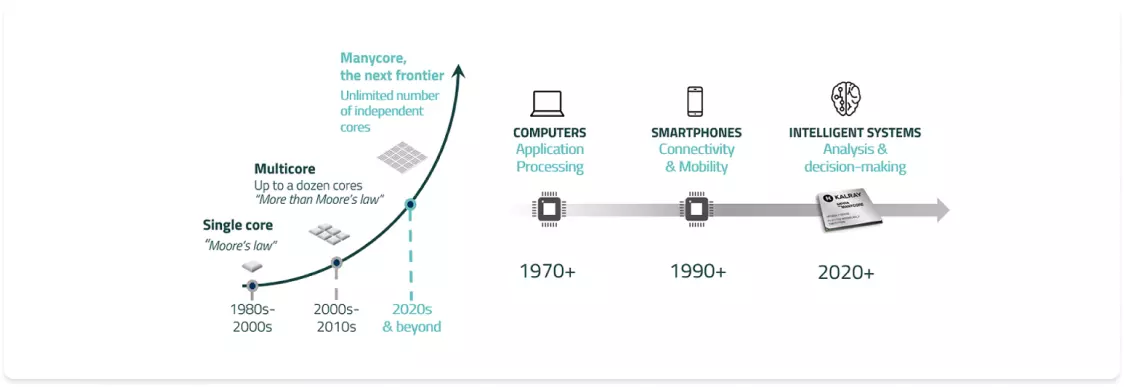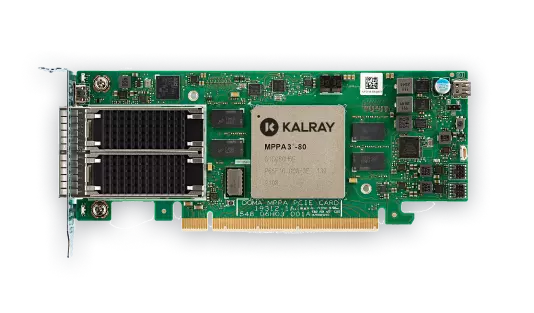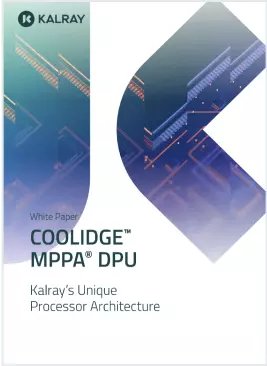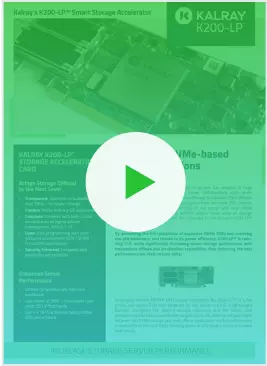Kalray Acceleration Cards
For High-Performance Storage
and Compute
Kalray MPPA® Manycore
A Massively Parallel Processor Array Architecture
The world is facing an explosion of data which current technologies were not initially designed for and cannot always handle efficiently. The industry needs a new type of processor. Enter the era of Intelligent processors.
The MPPA® interconnects are suited to different types of data transfers. The first interconnect is an AXIFabric bus grid, for read/write accesses from cores to memories and peripherals connected by PCIe. The second interconnect is an RDMANoC(Network-on-Chip), that supports data transfers to or from the Ethernet network interfaces and connects all clusters together.
The overall architecture of the Kalray 3rd generation of MPPA® processor aka Coolidge™ is based on a “Massively Parallel Processor Array” architecture, which is characterized by the association of computing clusters connected to each other, to the external memory and to the I/O interfaces via two independent interconnects.
The robust partitioning necessary for safe operation of the processor is carried out at the granularity of the computing cluster and is based on the configuration of memory management units (MMUs), memory protection units (MPUs), and on the deactivation or not of network on chip links.

Kalray Acceleration Cards
Efficient support of data
intensive workloads
AI acceleration: Up to 25 TFLOPs
(16 bits)/50 TOPs (8 bits) per chip
Best performance
per watt and per $
Power consumption as low
as 30W
Unprecedented
programmability
featuring open and pluggable architectures
Kalray Acceleration Cards
Coolidge is the third generation of Kalray’s MPPA technology. They offer an unprecedented level of performance and programmability. It is a game changer for data-centric heterogenous processing tasks as it significantly increases the performance per Watt and per dollar. Kalray accelerators are engineered to strike a balance between performance and power consumption, providing organizations with optimized power usage and energy efficiency for their data processing workloads. The energy-efficient MPPA architecture maximizes energy efficiency without compromising processing capabilities. Kalray MPPA processors are featured in Kalray’s Acceleration Cards.
TURBOCARD4 AI and Compute Acceleration Cards
TC4 embodies Kalray’s vision in addressing the intricate demands of modern computing workloads. Housing four of the latest generation of Kalray’s MPPA technology, Coolidge2™, in a single PCIe card. Kalray’s TC4 is designed to ensure customers can merge classical and AI-based processing technologies and create superior, efficiency-driven systems for the most processing-intensive AI applications. TC4 offers complementary architecture to GPUs, allowing the processing of a large number of different operations in parallel, asynchronously. TC4 is well-suited for pre-processing data for later use by GPUs or in the context of complex intelligent systems running many different algorithms in parallel.


PRESS RELEASE
TURBOCARD4 Compute Acceleration Cards
TC4 embodies Kalray’s vision in addressing the intricate demands of modern computing workloads …
K300 Acceleration Cards
The K300 cards deliver exceptional performance, programmability, and energy efficiency, setting new standards for performance per watt and per dollar. Designed for versatility, the K300 supports a wide range of use cases, including AI, Smart vision, networking, security, and telecoms. It integrates seamlessly with Kalray’s Easy Programming and Open software environment for fast and flexible deployment.

K200-LP Storage Acceleration Cards
K200 is Kalray’s family of data-centric acceleration cards, based on Coolidge. The K200-LP storage acceleration cards offer an unprecedented level of performance and programmability, a game changer solution in terms of performance per Watt and per dollar. Kalray K200-LP cards are easy to configure with the Easy Programming and Open software environment and can be used for networking, storage, security, AI and compute acceleration.


DATASHEET
K200-LP Storage Acceleration Cards
K200 datasheet box: By integrating K200-LP XPU PCIe cards into data storage servers and storage enclosures, data centers can accelerate their workloads…
Features |
Benefits |
|
|---|---|---|
| High performance data-centric processor with real-time processing |  |
Process more data faster |
| Parallel execution of heterogenous multi-processing tasks |  |
Process more data faster |
| Fully programmable with open software environment |  |
Easy to program and integrate |
| High speed interfaces: connected to high-speed fabrics |  |
Leverage state-of-the-art networking technologies |
| Secure islands, encrypt/decrypt, secure boot |  |
Data is secure during processing |
| Enables power efficiency |  |
Process more data per watt |
Kalray Solutions
Machine
Learning
Machine
Vision
5G / Edge
Computing
Automotive
Intelligent Data
Centers
Start Your Journey
WHITE PAPER
A new generation of processor is needed to support the “explosion of data” we’re experiencing today






